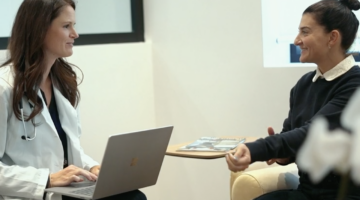
When CEO Jeff LeBrun and CTO Chuks Onwuneme co-founded optimize.health back in 2015, the startup was focused on medication adherence. Their first product, Pillsy, was a smart pill bottle that chimes when it’s time to take your medicine. But they saw a big opportunity when the Centers for Medicare and Medicaid Services expanded coverage of remote patient monitoring services last year.
At the time, the company had been integrating more devices into its platform to track the effects of medication adherence.

Solving Healthcare’s Provider Data Problem Starts with Interoperability
Break down the silos. Take control of your provider data.
“While medication adherence is one of the biggest causes of successful treatment, it doesn’t necessarily measure the impact. We were getting requests to measure the impact of adherence directly,” LeBrun said in a phone interview. “Then insurance started reimbursing for remote patient monitoring. We saw a need for a system that could provide high-quality monitoring while providing high levels of patient engagement.”
Now, the company builds software platforms to help physician practices and health systems implement remote patient monitoring programs. It pulls in data from supported devices, such as blood pressure, pulse oximetry and medication adherence, and sends it to the physician. The software also has engagement and reimbursement tools that automate note-taking and make it easier to stay compliant with Medicare requirements.
In the last year, optimize.health saw its revenue grow 800% year-over-year. In August, the Seattle-based startup closed a $15.6 million funding round led by U.S. Venture Partners.
“Optimize.health simplifies and automates what is otherwise a complex process providing a seamless experience for all audiences. The company’s extraordinary growth is a testament to the exceptional value their solution delivers,” U.S. Venture Partners General Partner Dafina Toncheva said in a news release.
More recently, optimize.health has been offering a full-service solution for health systems that don’t want to manage remote monitoring themselves. They have health coaches and nurses that they can bring in, as well as partnerships with call center companies that are familiar with its software.
The startup plans to use the new funds to further build out its platform, connect to more devices and deploy its software in more health systems. While many have implemented remote monitoring programs in recent years, there’s still plenty of room for growth.
“There’s more demand for remote care than ever before. I think patients are far more aware as well as the physicians,” LeBrun said. “With Covid, it became less of a nice-to-have and more of an existential moment.”
Photo credit: ra2studio, Getty Images








